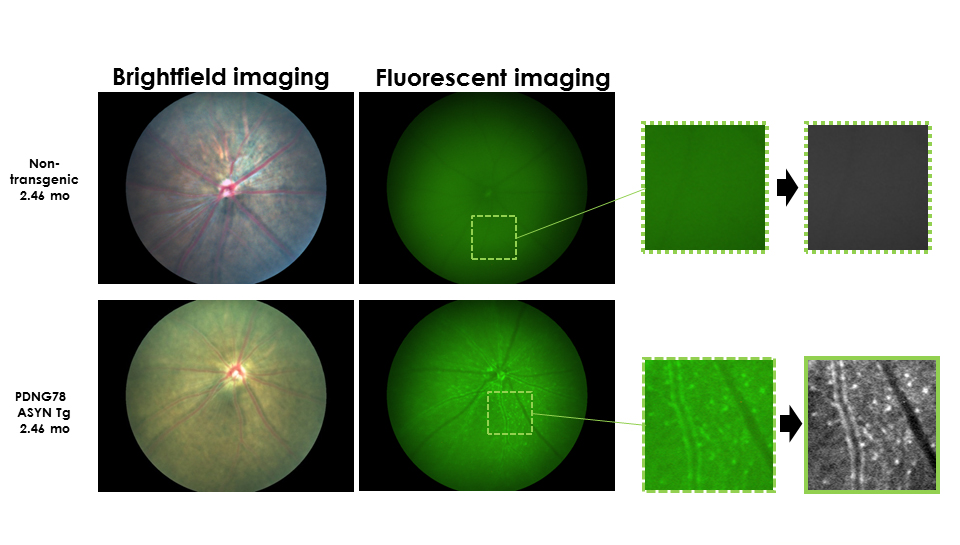News
Completion of a Study on Retinal Pathology in an Animal Model of Parkinson's Disease
Posted on April 8, 2014
Neuropore Therapies Inc. and collaborators at the University of California, San Diego complete a study on the progression of Parkinson's disease in Laboratory Animals Using Phoenix Research Labs' Retinal Imaging Technology
Pleasanton, CA, February 10, 2014 —
Phoenix Research Labs, Inc., Neuropore Therapies, and UC San Diego today announced breakthrough study results from an industry-academia collaborative effort demonstrating the utility and relevance of Phoenix's retinal imaging technology as a non-invasive and effective method to evaluate and track the progression of neurodegenerative changes in animal models of Parkinson's disease. This technology provides researchers with a fundamental new tool for detecting and tracking the progression of the underlying neuropathology in these disorders over time in an individual animal. The ability to non-invasively measure the developing neuropathology within the central nervous system provides investigators with a, previously missing, vital link between behavioral measures of central nervous system function and the underlying neuropathology in living animals.
The study utilized a transgenic mouse genetically engineered by UC San Diego researchers Edward Rockenstein and Dr. Eliezer Masliah to express a fluorescent- tagged version of a key protein involved in the pathology of Parkinson's disease. The Phoenix Micron Retinal Imaging Microscope was then used to image this protein in the retina across time during the course of the developing neuropathology in these animals. The findings from this study clearly demonstrated that progression of the Parkinson's disease-like pathology could be quantified through eye imaging in a unique mouse model system to evaluate retinal pathology as an additional or alternate indicator for central nervous system neuropathology. This new approach will provide great assistance to investigators working to discover new therapeutics for Parkinson's disease.
These findings also point to a possible method for non-invasively measuring this pathological hallmark of Parkinson' Disease in humans The identification of a biomarker tool for the early diagnosis of neurodegenerative disorders and then for following the course of the disorders through time or across different experimental treatments is vitally important for the development of novel "disease modifying therapeutics and is the focus of large scale collaborative efforts e.g., the Parkinson's Progression Markers Initiative (PPMI)," said Neuropore Therapies' Dr. Diana L. Price, Director of Neurosciences.

"Being able to assess neurodegenerative diseases using non-invasive means to observe the retina for protein level changes is an exciting development in translational research because of the potential future impact in the clinical arena," said Phoenix Research founder and CEO, Bert Massie, PhD. "Phoenix is very excited to see the Micron's unique ability to image fluorescent molecules, yielding data that so clearly aligns with published animal models."
About Phoenix Research Labs
Phoenix Research Labs is an animal eye research company focused on developing innovative technologies to advance and support in vivo eye and eye-brain research using laboratory animals. The comprehensive suite of Phoenix products includes the Micron IV Retinal Imaging Microscope, Image-Guided Optical Coherence Tomography (OCT) System, Ganzfeld (Electroretinogram) ERG System, Image-Guided Focal (Electroretinogram) ERG System, Image-Guided Laser System and Anterior Segment Image System. With systems located in the US, Europe, Asia and Latin America, Phoenix Research Labs has a global presence in the world ophthalmology research effort. Incorporated in 2008 by Dr. Bert Massie, the company is located in Pleasanton, CA. For more information visit www.phoenixreslabs.com.
About Neuropore Therapies, Inc.
Neuropore Therapies is an innovative biopharmaceutical company utilizing structure-based drug-design technologies to discover novel therapies for Parkinson's Disease, Alzheimer's Disease, and related neurodegenerative disorders. Neuropore has developed unique models of the processes by which the abnormal folding and deposition of neuronal proteins leads to synaptic dysfunction and cell death in these disorders. Using these technologies and models, Neuropore has discovered drug-like orally bioavailable compounds that block these pathological processes and dramatically improve outcomes in animal models. Neuropore is advancing it’s lead compounds through preclinical development with the goal of bringing potential new treatments for neurodegenerative disorders into clinical trial. For more information visit www.neuropore.com.
To read the complete "Neuropore Therapies Inc. and collaborators at the University of California, San Diego complete a study on the progression of Parkinson's disease in Laboratory Animals Using Phoenix Research Labs' Retinal Imaging Technology" paper click here.
For Further Information
Media Contact Neuropore:
Dieter Meier, MD
Chief Executive Officer
Email: Dieter.Meier@neuropore.com
